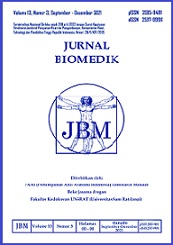THE INFLUENCE OF EATING HABITS OF MINAHASAN DISHES ON THE OCCURENCE OF CORONARY HEART DISEASE
DOI:
https://doi.org/10.35790/jbm.2.3.2010.1196Abstract
Abstrak: Penyakit jantung koroner (PJK) merupakan masalah kesehatan jantung baik di dunia maupun di Indonesia termasuk Propinsi Sulawesi Utara, dan menempati urutan pertama sebagai penyebab kematian. Penyebab terjadinya PJK multifaktorial; salah satunya adalah kebiasaan makan yang dipengaruhi oleh faktor budaya, adat istiadat, agama dan kepercayaan. Penelitian ini dilakukan untuk mengetahui pengaruh kebiasaan makan makanan etnik Minahasa terhadap kejadian PJK. Metode case control dengan 128 kasus dan 128 kontrol yang diambil dari RSU Prof. Dr. R.D. Kandou. Dilakukan pengumpulan data frekuensi makan dengan menggunakan Food Frequency Quationnaire (FFQ) untuk melihat hubungan ke-biasaan makan dengan PJK. Umumnya makanan etnik Minahasa mengandung asam lemak jenuh 0,01-10,46 % per 100 gramnya. Seseorang yang mengomsumsi jenis makanan berisiko PJK seperti babi putar dengan frekuensi makan ≥ 2 kali/bulan mempunyai kemungkinan terkena PJK 4,43 kali lebih besar dibanding dengan yang mengonsumsi ≤ 1 kali/bulan, setelah dikontrol oleh babi hutan (OR=4,3 95% CI:1,66-11,05), kotey/sa’ut (OR=7,15 95%CI: 1,70-30,08), merokok (OR=2,76 95% CI: 1,36-5,61), usia (OR=1,96 95%CI: 1,36-2,83), jenis kelamin (OR=2,86 95%CI: 1,41-5,78), dan hipertensi (OR=5,86 95%CI: 2,94-11,66). Berda-sarkan 41 jenis makanan yang dikomposit, seseorang yang mempunyai kebiasaan makan makanan etnik Minahasa dengan frekuensi sering (total skor ≥ nilai mean) mempunyai kemungkinan 5,4 kali lebih besar untuk terkena PJK dibanding dengan yang mempunyai kebiasaan makan jarang (total skor ≤ nilai mean), setelah dikontrol oleh faktor jenis kelamin, riwayat PJK dalam keluarga, dan diabetes.
Kata kunci: kebiasaan makan, makanan Minahasa, asam lemak jenuh, penyakit jantung koroner.
Â
Â
Abstract: Coronary Heart Disease (CHD) is the leading cause of disability and mortality in Indonesia and North Sulawesi as well as the rest of the world. There are many factors that contribute to the development of CHD. Eating habits are believed to be risk factors and are influenced by culture and religion. This research explores the influence of eating habits of the Minahasans, particularly of the dishes that contain high level of fats contributing to the development of CHD. The methodology of this research involved case controls. The respondents were taken from Prof. Dr. R.D. Kandou General Hospital in Manado, North Sulawesi. The samples were divided into two groups consisting of 128 cases of CHD and 128 cases without CHD for control. Eating frequencies were obtained through Food Frequency Questionnaires (FFQ). The purpose of using these analyses was to obtain the actual effects of the eating habits involving a variety of Minahasan dishes which were believed to have had some contribution to the risks of CHD. Those who ate whole roasted pigs more than twice a month were 4.43 times more susceptible to develop CHD compared to those who ate whole roasted pigs less than once a month, after being controlled by the eating of wild boar (OR=4.3 95% CI: 1.66-11.05), banana heart and stem (OR=7.15 95% CI: 1.70-30.08), smoking (OR=2.76 95% CI: 1.36-5.61), age (OR=1.96 95% CI: 1.36-2.83), gender (OR=2.86 95% CI: 1.41-5.78),  and hypertension (OR=5.86 95% CI: 2.94-11.66). Based on the consumption of 41 kinds of Minahasan dishes, those who frequently ate these on a daily bases had a 5.4 higher probability of developing CHD with an eating habit score of ≥ mean value, compared to those who ate less frequently with an eating habit score of ≤ mean value, after being controlled by gender, family history of CHD, and diabetes mellitus.
Key words: eating habit, Minahasan foods, saturated fatty acid, coronary heart disease.
Downloads
Issue
Section
License
Penyunting menerima sumbangan tulisan yang BELUM PERNAH diterbitkan dalam media lain. Naskah yang masuk dievaluasi dan disunting keseragaman format istilah dan cara penulisan sesuai dengan format penulisan yang terlampir dalam jurnal ini.
Segala isi dan permasalahan mengenai tulisan yang yang diterbitkan dalam jurnal menjadi tanggung jawab penuh dari penulis.







